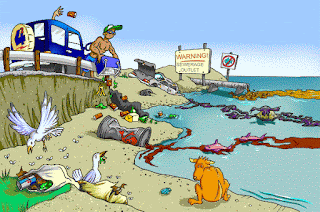Light pollution, also known as photopollution or luminous pollution, is inappropriate or excessive,
misdirected, and prolonged use of artificial (usually outdoor) light. Too much
light pollution has consequences: it washes out starlight in the night sky,
interferes with astronomical research, wastes energy, disrupts ecosystems and
wildlife and has adverse health effects. Concerning human beings, research
suggests that the exposure to artificial light at night can negatively affect
human health, increasing risks for obesity, depression, sleep disorders,
diabetes, breast cancer and more.
Light pollution comes in many forms. The most common
include the following:
- Glare: This is the effect produced when the eyes are exposed to excessive brightness that causes visual discomfort. The most common causes of glare include bright streetlights and car lights.
- Sky glow – This is the bright orange-pink glow that hangs over cities and towns in the night.
- Light trespass – light falling where it is not intended or needed.
- Clutter – bright, confusing and excessive groupings of light sources.
The concept of light pollution is a phenomenon that occurs
all over the world, not only in some places. It is something that is very
common in large cities, and Chile is no exception. The
north of Chile has one of the clearest skies in the world. Thanks to the dry climate and clear air of the Atacama Desert, the
Chilean night is a main place to observe the universe. Therefore, Chilean government passed a law to help preserve the visibility of the sky in the northern regions of Antofagasta,
Atacama and Coquimbo. In these regions, there are large scientific and tourist
observatories and the invasion of this kind of pollution affects the vision of
telescopes and the clarity needed to capture events that occur in the galaxy
through the lens.
In my opinion, light pollution affects every citizen
and it is highly valuable that the Chilean government is concerned about
preserving the purity of the Chilean night sky. Besides helping astronomers,
the new law could help attract tourists because our sky has a great potential
and gives an advantage in world astronomy.
For
further information click on the link above.








